- Home
- Alice Hoffman
Property Of, the Drowning Season, Fortune's Daughter, and At Risk Page 10
Property Of, the Drowning Season, Fortune's Daughter, and At Risk Read online
Page 10
McKay left the Orphans gathered around the Chevy to come sit with me in the bleachers. He took my hand. “Darling, I know,” he said.
I stared into the air. “What do you know?” I turned to McKay and saw that he did not smile at my words. “Darling,” I said, and I held my arm around McKay, took the hand which held mine and placed his fingers to my lips. “You know,” I whispered.
“At least the Dolphin ain’t here,” said McKay. “That should make you smile.”
I responded to that.
“Ah, I see it does. Well, it won’t make Starry smile. She would never have left the city if she knew the Dolphin wouldn’t be here.”
“You lied?” I said.
McKay gave me his darkest eye.
“You implied,” I said.
“I won’t have talk all along the Avenue about the Number One Property. The Orphans can’t have so little honor as that.”
I saw Kind’s eye on us. “You can always draft Kind,” I said.
“An idea,” said McKay, laughing, and he left me so that he could return once more to the Chevy. I followed, for Starry motioned to me with a wave of her hand.
The crowds began to stream through the turnstiles, and the Orphans claimed front-row seats. Starry waited behind the Orphans for me to reach her.
“I’m hurting,” Starry said. “I never thought McKay would be this far out of the city without the Dolphin to cop from. He’s going to be hurting, too, McKay is. Or does he have some shit?” Starry pressed her fingers into my arm, and she held me back from joining the Orphans, who passed a reefer from one hand to the next. “Does he have some?” Starry whispered. “Can you get me something to get high with?”
“Starry,” I said. “McKay is not a goddamn addict. He just gets high sometimes. He doesn’t need it, he doesn’t have to bring dope with him.”
“Bullshit,” Starry said. “You don’t know.”
“I do,” I said. “What’s more, McKay knows about you. He knows how much dope you been using.”
“That’s why he didn’t say a word about the Dolphin not being here. He wants me to admit it. He wants to force me to resign from the Orphans.” Starry bit her lip. “That fucker,” she said. “McKay will screw every one of us with his honor.”
“He won’t force you to resign,” I said.
“That wouldn’t be honorable,” she sneered.
I reached out to touch Starry’s shoulder, but she shrugged me off. We sat with the Orphans and as Danny the Sweet passed a joint to me I watched Starry’s shoulders shudder slightly. Her pale hands shook as I passed her the reefer.
“Long time no see,” said the Sweet as McKay’s Chevy forced a Ford to jump the track and smash into the wire meshing that protected the stands.
“A long time,” I agreed, but I could not look at the Sweet as I answered him. He placed his hand on my knee.
“It’s all right,” said the Sweet. “It’s cool,” he said. “Hey, you think I feel ignored? Hey, you think I’m insulted? It’s cool, I tell you.”
“It’s cool?” I smiled at him.
Danny kissed me very lightly; his breath was sweet as sugared cough syrup. “You know it is,” he said. I sat between Starry and Danny the Sweet, and we watched McKay win.
After the races, when the moon was high, and the air cool and salty, the Orphans gathered around a campfire on the shoreline. With the prize money in his pocket and the speed of the Chevy common knowledge, McKay smiled into the air. I stayed close to McKay, and used words which made him promise that we would not spend the night in a sleeping bag, on the sand, surrounded by Orphans. He was a winner; the least he could afford was a motel room and a few hours. We sat close together in the sand and whispered. Then I saw Starry’s face, the strained whiteness against the night. I nodded to McKay, and he motioned Starry to join us.
“Glad to see you could make it to the race,” McKay said as he sipped from a can of beer. The dark fire of his eyes settled on Starry’s profile. “You know it wouldn’t look good if the Number One Property wasn’t around for my victory.”
“Fuck your victory,” said Starry.
McKay lit a cigarette and was silent.
“McKay,” Starry said, “don’t ask me to do this.”
“Honey,” he said, “you asked for it. And I have no choice but to protect the Orphans’ name.”
“From what? What are you protecting? McKay, don’t ask me to give up what I have. Don’t ask me to give it all up.”
If McKay took the Orphans away from Starry she would belong to no one. If he took away the letters on the jacket she would belong to no one. Only the city, the needle; no one else.
“Let it wait until tomorrow,” I whispered to Starry.
“She can’t wait,” said McKay. “Don’t you see she can’t wait?”
“I know you’re using,” said Starry. She hesitated. “I need it now,” she said. “I need it right now.”
McKay was silent.
“All right,” she whispered. “Fix me and I’ll go. Fix me and I’ll go back to the city.”
McKay was ready. He stood up and his shadow covered us. The sound of the Orphans rose around us, for Irene had announced her engagement to the Viet Nam boyfriend, and great hoots of laughter and cheers greeted her words.
“I want you to know it’s not the dope,” McKay said to Starry. “It’s honor that’s at stake.”
Starry shook her head. “McKay,” I whispered. When he spoke of honor I felt that losing him was seconds away.
“Why a hooker?” McKay continued. “Why didn’t you come to me and tell me?”
“So I’ve turned some tricks,” Starry whispered. “How the hell do you expect me to get money? I could rob a liquor store as well as you can, but that wouldn’t be ‘honorable’ for Property to do. What am I supposed to do with no car, with no gun, with nothing but my body? If I had come to you, if I had told you I was hurting and I had a habit, what would you have done?”
McKay was silent.
“Yeah,” said Starry. “Yeah, that’s right. Nothing. You would’ve told me to shut up and done nothing. You wait,” Starry said. “You wait till you have no money, till you need to cop some dope and there’s no one there. Wait till you hurt so bad that you no longer care about honor. Wait. You’ll be turning tricks before long. Before you even know it, you’ll be turning tricks, McKay.”
McKay stared into the night. The air was cold now that the wind was rising off the ocean. Tomorrow the heat would begin once more, the temperature would rise, and skins would burn. But tonight, even with the protection of fire and leather, bumps rose on the skin.
Starry was shivering in the cold. “Just fix me once,” she said. “I know you got dope with you, fix me once and I’m gone for good.”
McKay sat so close that his jacket covered both our shoulders. “You have it with you here?” I whispered. “Why do you have it with you?” Perhaps my whisper was so soft that McKay did not hear. He did not answer.
“Flash wants me to move in with him,” Starry said to me.
My words were immediate. “You won’t,” I said.
“I will,” she said. “Why not?”
“You change your allegiance fast,” said McKay.
“Boy, you know me better than that,” said Starry. “But if I’m not Property, I need something. I need protection. I might as well be with Flash, at least he can always fix me. He’s got dope all the time and he’ll take care of me.”
“In the Chevy,” said McKay. “And then that’s it. I don’t want to see you with the Orphans no more. I don’t even want to see you on the Avenue.”
McKay and Starry spoke as dreamers do, looking not at each other, but only into the air. I watched Starry’s face for a tear, for anything, but she only stared in the direction of the Atlantic. The water was too dark to see, but the waves broke onto the sand like a heartbeat in the night.
I watched them walk to the Chevy. Then I looked away and wished myself in that car with McKay and Starry, holding the
belt, rolling up my sleeve; together in the Chevy. I felt only jealousy. This was not the way I was jealous of Kind, or of the cars full of girls that followed the Chevy down the Avenue. I was jealous in a way I would have never been of sex, of another woman. I was jealous of the intimacy of the needle. Any fear, any sadness at Starry’s exclusion disappeared. If she stayed she would be closer to McKay than I was, as close as the Dolphin. I wanted her gone.
Danny the Sweet was awakened from sleep. He was given Flash’s address and told to start the engine of his Pontiac immediately and drive Starry back over the City Line. The Sweet, as always, was flattered by McKay’s choosing him to run an errand. With his grin in the moonlight and his boots racing so that he could comply with McKay’s wishes, Danny made me want to reach out to him as he passed by winking and rolling his eyes. But McKay’s eyes were their darkest and I only nodded to the Sweet and walked slowly toward the Pontiac with Starry.
“I won’t be hustling no more,” Starry said with slurred words. “I only did that to keep secrets from the Orphans. To protect the Orphans. Now I got Flash and no secrets.” She smiled. “So now you’ll be Number One Property.”
“No,” I said. “I never cared about that.”
“Only McKay.”
McKay had started the Chevy engine. He called my name and the Sweet honked the Pontiac’s horn.
“You watch,” Starry said. “He’ll be turning tricks.”
We both looked at McKay as he sat at the wheel of the Chevy. There was the salt smell of ocean, the night, and his dark eyes.
“That man?” I laughed. “Starry, honey, that man is too beautiful to have to turn tricks.” And we laughed the laugh that turns to silence much too quickly.
“Don’t be jealous of the needle,” Starry said, and I wondered if my fears were so easy to see as that. “Don’t be jealous of the needle; it’s not such a very fine lover as you may think. But if you got the money, it sure is a reliable lover. It always comes.”
Irene and her Viet Nam boyfriend danced in the sand and the Orphans howled and clapped hands. The Chevy engine began to strain. I left Starry at the door of the Pontiac to walk toward McKay.
“You know one thing,” Starry called and I did not turn around; I only stopped in the sand. “You know I still got a telephone. You know you can call me.”
I kept walking, I left tracks in the sand. The Sweet’s Pontiac drove off the shore on its way to the city. I thought, after all the months, the words, the kisses, I still have not gotten what I wanted. Yes, McKay allowed me to unpack my suitcase in his closet; but he would not admit me into his soul. And I wanted nothing less. If you say that was too much to ask, I will agree. And then I will repeat: I wanted nothing less. It seemed I could not get what I wanted. I opened the door, sat near McKay in the Chevy, and as we drove, the wheels spun sand into the night. Through the silence of the shore we could still hear the howls of the Orphans.
We drove to a seven-dollar-a-night motel and as we pulled into the parking lot McKay turned to me. “I’m going to quit it,” he said. “I ain’t gonna be like Starry. I can live without getting high. I can live after I cross the City Line.”
I looked into his eyes and I wanted every secret of mine to be his, every secret of his to be mine. I began to know the spells; the spell was love, the spell was honor, and the easiest spell of all was what McKay now spoke of: heroin. That is why I wanted the same needle in both our arms. I thought it might be worth the price to have someone with eyes like McKay’s to fix me for the first time with the magic that has no color, no odor, no chant, no song at all. Yes, it’s true I wanted the needle in his vein; but it was only love.
“One more time,” he said, as we walked toward the bright fluorescence of the motel. “It would be crazy to waste good dope. One more time is all,” he whispered.
It was only love. And I thought I had found the easiest of spells.
“Together,” I said.
“No,” he said.
Six months with McKay, and being with him was lonelier than being without him. At the beginning I thought I only wanted his name, but that was not enough. Words were not enough. Not even a body, skin, whispers, not even these were enough. And so I stopped McKay in the darkness of the parking lot with arms, with whispers, and with sighs.
“Yes,” I said.
“This one time,” he said. “Only this one time.”
Six months, six ways to fall in love, six positions of helplessness, and still all is changed and nothing is different. Do I always go to that motel with McKay? Does he always pour white powder into my vein as we stand in the toilet of the motel room as the gold-speckled ceiling showers flecks of paint on our skins? Am I always willing to pay the price of admission on that night? And is there always the same ritual; do I always roll up his sleeve and kneel before him and smile as the point of the needle touches his skin? Over and over again and always?
I confess to you now. I confess it all: I was willing. I wanted the spell, I wanted the magic; I would agree to any drug to keep him hooked. I wanted the tracks to run down McKay’s arm in thin crooked lines, and I wanted to control the direction in which they ran. Through the heart. I wanted the tracks to run straight through the heart. I smiled, and ran the spoon that held the heroin across my tongue, and it was sweet. It was sweet, and it was easy, and I thought it was the price I had to pay.
The marks on my arms didn’t touch the vein; there were never that many of them, only enough to try to stop the knowing. The knowing that I was trying to begin what could not be begun. The marks on my arms were only to stop a confession from ever having to be written down in black and white, in sentences and lies. It did not seem like so much at the time. It was only white powder and the blue liquid of his vein and love. That was all, powder and liquid and a heartbeat. That did not seem too high a price to pay for what I wanted. Not when what I wanted was everything. And I said the word very softly, and held McKay close, and closed my eyes.
“Yes,” I said to him. “Yes.”
2
I sat on the farthest stool at Monty’s counter and watched McKay as he stood enclosed in the glass telephone booth. I chewed ice as a remedy against the heat. The old fan nailed to Monty’s ceiling spun with a humming sound.
“Forget the ice,” said Monty, “and have a drink. A real drink.”
“What do you suggest?” I asked, and played with the cuff of my shirt.
“A double gin,” said Monty.
“Your lips touch alcohol?”
“When the temperature rises above ninety these lips welcome a bit of gin.”
“A bit?” I said. “A bit of gin? Old man.”
“There’s worse than drink,” said Monty.
So that was it. An admission of drink for a confession of dope. It wouldn’t work. I pulled the chain I wore from beneath my shirt. I held up the charm, and I smiled.
“You haven’t thrown it away?” said Monty. “You surprise me.”
More than not throwing the locket away, I had taken to wearing the charm constantly; even when I wore nothing else, even while I slept, I wore the tooth of a beaten man, the tooth of a dragon.
“Why haven’t you thrown it away?” Monty said.
“I don’t know,” I said softly.
“What, now?” said Monty.
“Superstition,” I said.
Monty shrugged and I looked away. McKay was dialing again, searching for the Dolphin with numbers and telephone wires. Dialing again in the glass booth.
“Not a trace of Starry on the Avenue,” said Monty. There hadn’t been a trace of Starry anywhere. Her name was never mentioned among the Orphans, not one of the Property had asked what had become of her. But if the wind of the Avenue blew as Monty said it did, the Orphans and the Property had all known for some time why Starry was no longer seen walking down the Avenue sidewalk, why she no longer waited in the last booth of the Tin Angel.
“She seems to be gone,” I said, and Monty poured himself a glass of gin.
; McKay came out of the telephone booth. He slid his boot heels along the wet sheen of the newly waxed linoleum and then skidded to a stop.
“Got it,” he said. “Come with me for the ride.”
“No,” I said.
“No?” said McKay.
“No?” said Monty.
It was true I had taken to going everywhere McKay went, but they should not have been surprised at my answer when the destination was the Dolphin. Never would I go to the Dolphin.
Some corner kids hung around the freezer case. “Hey,” said McKay. “You.” He nodded to a dark-haired boy who lounged near the coldness of the freezer with a scowl and a cigarette. The corner kid walked toward us; there was no refusing an Orphan.
“He’s the one,” said Monty. “The kid’s name is Tony and he’s the one seems to have so many questions about the Orphans.”
The corner kid stared silently at the floor.
“Tony,” I said, “don’t you got something to do?”
Tony shook his head and McKay smiled. “Leave the kid alone,” McKay told me.
“McKay, he’s fourteen,” I said. “What do you need him for?”
“Don’t you worry,” said Monty. “This one is not what you call young. This one can grab a purse from an old lady in seconds. This one’s outfit is never complete unless he’s carrying a ball bearing in a sock to knock a fellow’s eyeteeth down his throat.”
“Hey, fuck off,” Tony told Monty.
McKay laughed. “You know what my jacket says?”
Tony nodded and his eyes moved warily. “Sure,” he said. “You the Prez.”
“That true about old ladies?” said McKay.
“No,” said Tony.

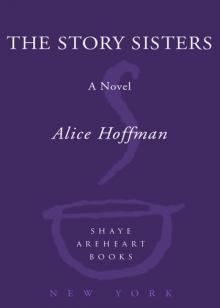 The Story Sisters
The Story Sisters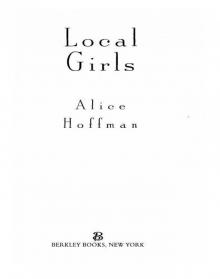 Local Girls
Local Girls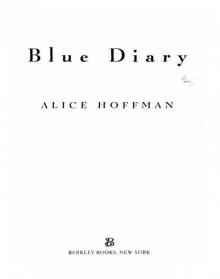 Blue Diary
Blue Diary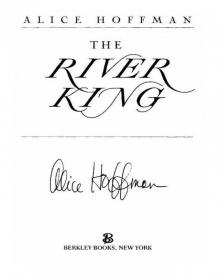 The River King
The River King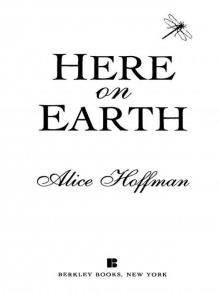 Here on Earth
Here on Earth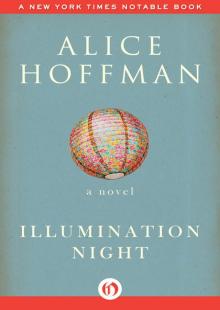 Illumination Night: A Novel
Illumination Night: A Novel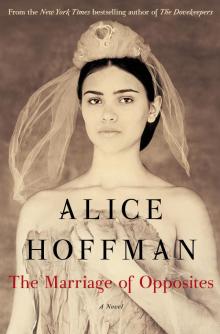 The Marriage of Opposites
The Marriage of Opposites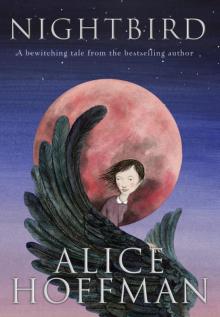 Nightbird
Nightbird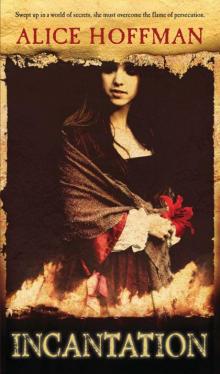 Incantation
Incantation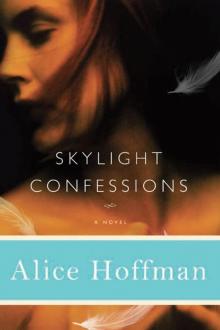 Skylight Confessions
Skylight Confessions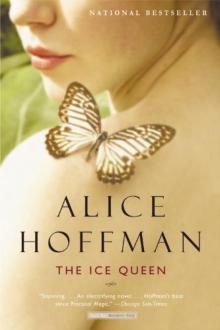 The Ice Queen
The Ice Queen Second Nature
Second Nature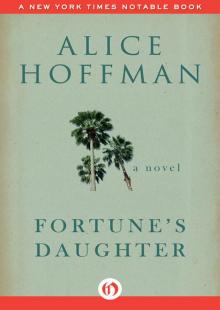 Fortune's Daughter: A Novel
Fortune's Daughter: A Novel Seventh Heaven
Seventh Heaven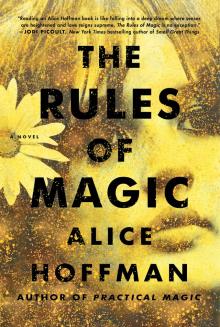 The Rules of Magic
The Rules of Magic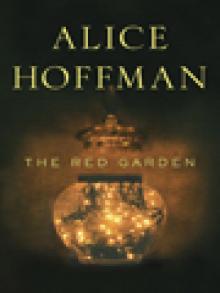 The Red Garden
The Red Garden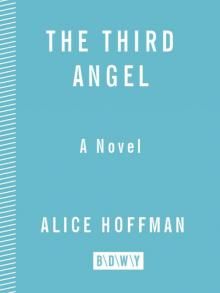 The Third Angel
The Third Angel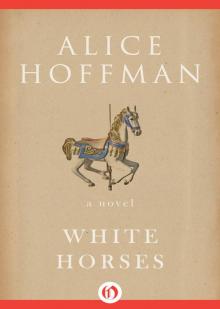 White Horses
White Horses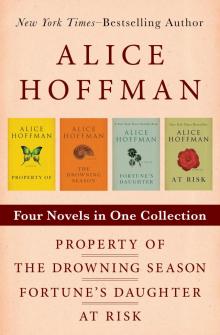 Property of / the Drowning Season / Fortune's Daughter / at Risk
Property of / the Drowning Season / Fortune's Daughter / at Risk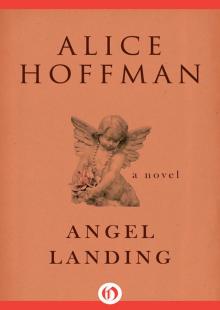 Angel Landing
Angel Landing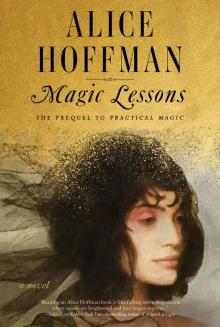 Magic Lessons
Magic Lessons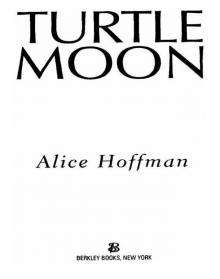 Turtle Moon
Turtle Moon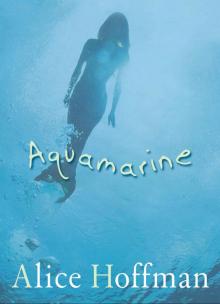 Aquamarine
Aquamarine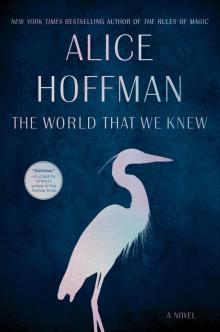 The World That We Knew
The World That We Knew Faithful
Faithful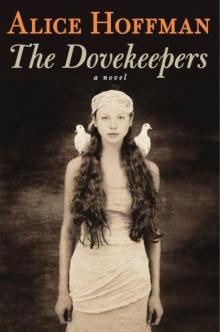 The Dovekeepers
The Dovekeepers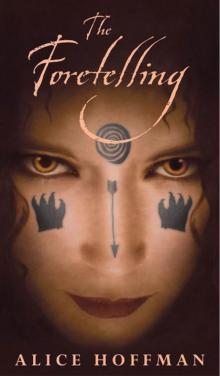 The Foretelling
The Foretelling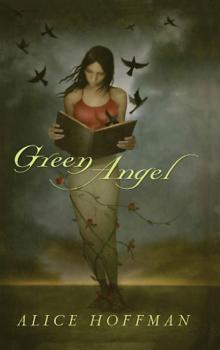 Green Angel
Green Angel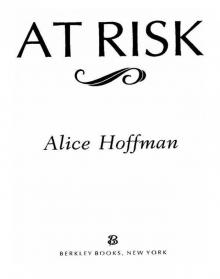 At Risk
At Risk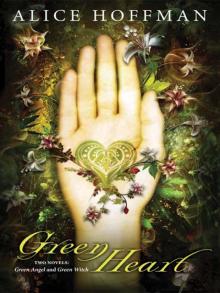 Green Heart
Green Heart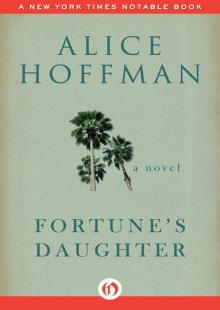 Fortune's Daughter
Fortune's Daughter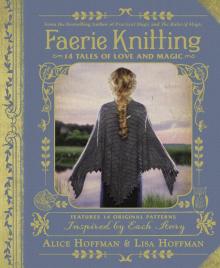 Faerie Knitting
Faerie Knitting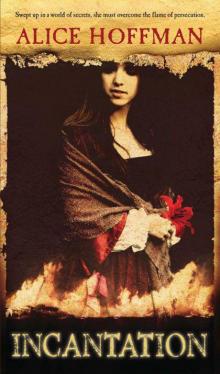 Incantation (v5)
Incantation (v5)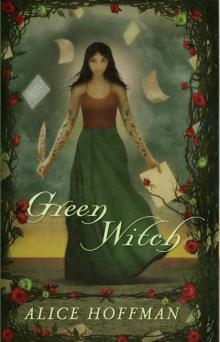 Green Witch
Green Witch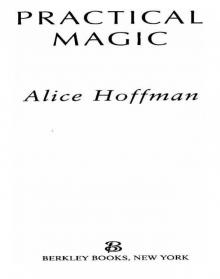 Practical Magic
Practical Magic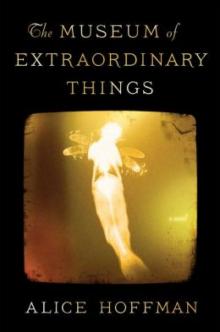 The Museum of Extraordinary Things
The Museum of Extraordinary Things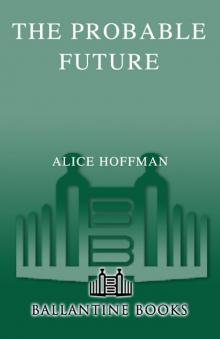 The Probable Future
The Probable Future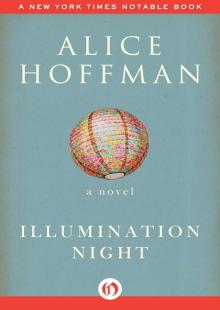 Illumination Night
Illumination Night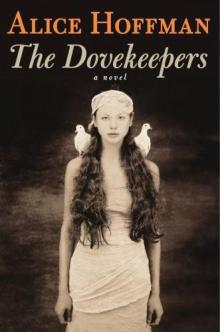 The Dovekeepers: A Novel
The Dovekeepers: A Novel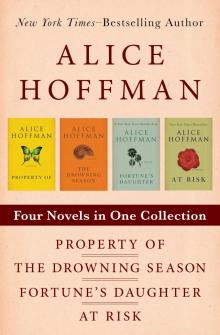 Property Of, the Drowning Season, Fortune's Daughter, and At Risk
Property Of, the Drowning Season, Fortune's Daughter, and At Risk